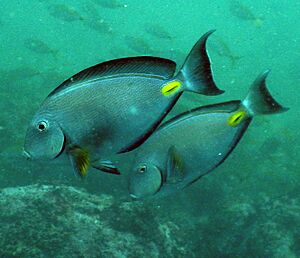Acanthurus monroviae facts for kids
Quick facts for kids Acanthurus monroviae |
|
|---|---|
 |
|
| Conservation status | |
| Scientific classification |
|
| Kingdom: | Animalia |
| Phylum: | Chordata |
| Class: | Actinopterygii |
| Order: | Acanthuriformes |
| Family: | Acanthuridae |
| Genus: | Acanthurus |
| Species: |
A. monroviae
|
| Binomial name | |
| Acanthurus monroviae Steindachner, 1876
|
|
| Script error: The function "autoWithCaption" does not exist. | |
Script error: No such module "Check for conflicting parameters".
The Monrovia doctorfish (scientific name: Acanthurus monroviae) is a type of fish that lives in the ocean. It belongs to a group of fish called Acanthuridae, which includes surgeonfishes, unicornfishes, and tangs. You can find this fish in the eastern part of the Atlantic Ocean.
About the Monrovia Doctorfish
Scientists give every living thing a special scientific name. The Monrovia doctorfish got its name, Acanthurus monroviae, in 1876. An Austrian scientist named Franz Steindachner, who studied fish, was the first to describe it. He found the first known fish of this kind near Monrovia, Liberia.
What Does It Look Like?
The Monrovia doctorfish has an oval body that is flat on the sides. It is mostly brown. It has a bright orange-yellow patch near its tail, where a sharp spine is located. This spine is like a surgeon's scalpel, which is why these fish are called surgeonfishes!
When the fish is alive, you can see many wavy, light blue lines on its head and body. The top edge of its gill cover is yellow. Its tail fin is shaped like a crescent moon and has a whitish edge. This fish can grow up to about 45 centimeters (about 18 inches) long.
Its back fin has 9 stiff spines and 24 to 26 soft rays. The fin on its belly has 6 spines and 24 to 26 soft rays.
Where Does It Live and What Does It Eat?
The Monrovia doctorfish lives in the warm, tropical waters of the eastern Atlantic Ocean. You can find it from southern Morocco all the way down to Angola. It also lives around the Canary islands, Cape Verde, and in the Gulf of Guinea.
Sometimes, this fish has been seen in the Mediterranean Sea since 1987, though it's not common there. A few have even been reported off the coast of Brazil.
This fish likes to live near the coast. It can be found near the mouths of rivers and in calm, shallow lagoons. It prefers places with rocks and coral. It lives at depths from about 5 meters (16 feet) to 500 meters (1,640 feet). The Monrovia doctorfish eats tiny ocean creatures called zooplankton and phytoplankton. It also eats dead plant and animal matter, called detritus.
 | Madam C. J. Walker |
 | Janet Emerson Bashen |
 | Annie Turnbo Malone |
 | Maggie L. Walker |


